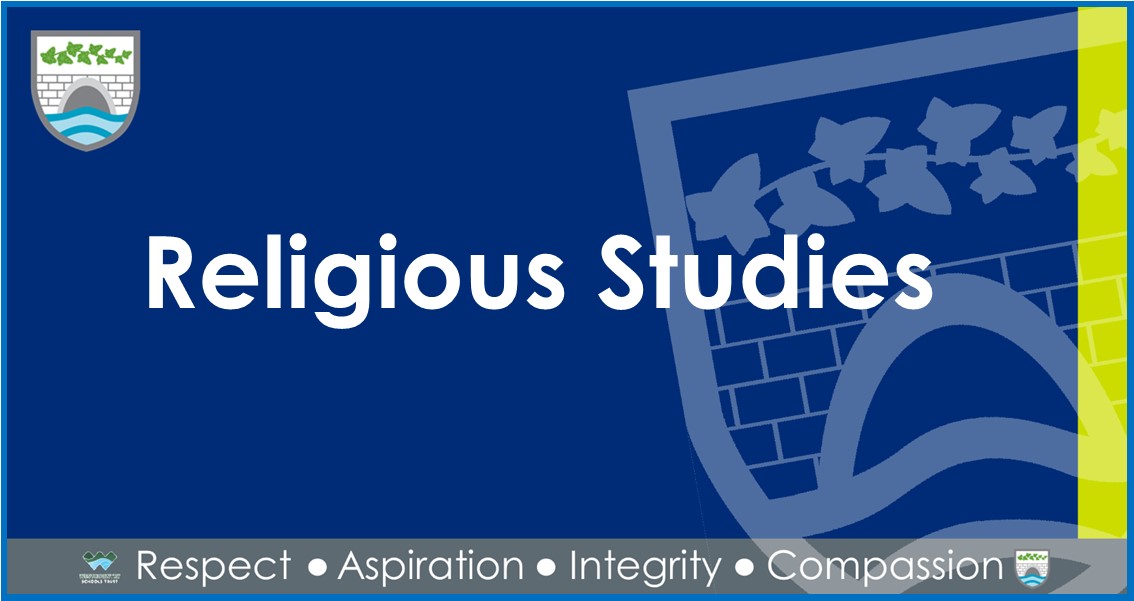Religious Studies
Please note: if you are viewing this page on a mobile phone, you may need to view in Landscape in order to view all of the content.

Head of Subject
Gail Snodin
Welcome to the Religious Studies Department at Ivybridge Community College.
The principal intent of religious studies at Ivybridge Community College is to explore what people believe and what difference this makes to how they live, so that pupils can gain the knowledge, understanding and skills needed to handle questions raised by religion and belief, reflecting on their own ideas and ways of living.
Our curriculum is based around the concept that everyone has a personal worldview, and we explore the relationship between organised and institutional worldviews and the individual worldviews of our global society.
This will be studied using a world views approach, where both religious and non religious beliefs and values are incorporated.
All learning will be based on enquiry questions.
Key Stage 3
During Year Key Stage 3, students have two 1 hour lessons a fortnight. As well as studying major world religions, students have opportunities to explore ethical issues.
--------
Year 7 areas of Study
What do we mean by worldviews and how do we see the world today? |
What is it like to be a Sikhi today? |
How can there be a God if there is suffering in the world? |
What needs to be changed in the world? |
How might we respond to inequality in the world? |
What is it like to be a Muslim in today's world? |
How do we respond to stereotyping, prejudice and discrimination? |
--------
Year 8 areas of Study
The impact of world views on my life and the lives of others. |
How do we see the world as a theologian, philosopher and sociologist? |
Who was Jesus and what impact did and does he have
|
Where does belief come from? |
Does the world need a saviour today? |
Who was Buddha?
|
Why do people suffer in today's world? |
--------
Year 9 areas of Study
The impact of world views on my life and the lives of others? |
How do we see the world as a theologian, philosopher and sociologist? |
How does a belief in Sanatana Dharma influence the lives
|
What happens when we die? |
Virtues and ethics –
|
How can we apply ethical theories to moral issues? |
--------
Students will also have the option to take part in the
National Spirited Arts Competition.
Key Stage 4 - Core
Year 10 and 11 Core
All students will study Religious Studies for one hour over two weeks. This will be a non examined course.
--------
Year 10 areas of Study
Crime and Punishment |
Philosophy of Religion |
--------
Year 11 areas of Study
Peace and Conflict |
Key Stage 4 - GCSE Option
At the end of Key Stage 4 the students will sit two exams, one on each of the units ‘Study of Religions’ and ‘Thematic Studies’, with a view to achieving a full GCSE. The lessons will give the students the opportunity to debate and discuss. Fifty percent of the examination requires students to know and understand religion and belief systems and a further 50% allows the students to analyse and evaluate aspects of religious belief.
--------
Course Content
The unit ‘Study of Religions’ looks at the following topics:
Christianity |
Hinduism |
| Beliefs and Practices | Beliefs and Practices |
--------
The unit ‘Thematic Studies’ looks at the following topics:
Relationships and Families
|
Marriage |
Sexuality |
Contraception |
|
The role of families |
Gender Identity |
Peace and Conflict
|
Forgiveness |
Peace |
Reconciliation |
|
Just War |
Terrorism |
Pacifism |
| Weapons of Mass Destruction |
Religious responses to War |
Crime and Punishment
|
Good and Evil |
Reasons for Crime |
Types of Crime |
|
Aims of Punishment |
Suffering |
Treatment of Criminals |
|
|
The Death Penalty |
|
Religion and Life
|
Creation |
The Big Bang |
Evolution |
|
Religious attitudes to the Environment |
||
|
Animal rights |
Abortion |
Euthanasia |
--------
Exam board information
|
For further details regarding the Course,
|
Key Stage 5
“The unexamined life is not worth living” Socrates
A Level Course Outline
Do you enjoy discussion and debate?
Do you like to think about questions such as:
Are any civilians
|
Is there any purpose
|
What do we really mean
|
Can we be sure about
|
Would you like to learn about some of the greatest thinkers that have ever existed and their ideas?
Would you like to challenge yourself intellectually?
If you can answer yes to any of these questions, then Religious Studies is for you!
--------
The A Level in Religious Studies encourages learners to:
Develop their interest in a rigorous study of religion and belief
|
Develop knowledge and understanding appropriate
|
Develop an understanding and appreciation of religious thought
|
Adopt an enquiring, critical
|
Reflect on and develop their own values, opinions
|
--------
Course Content
This new specification for first examinations in 2016 makes this a linear course. Content covered in Year 1 will be developed and examined in the Year 2 examinations. Therefore, 100% of the qualification will be from marks achieved in the Year 2 examinations, with each paper having a weighting of 33.3%.
Component 1: A study of religion (Christianity)
There will be four themes within each option...
Religious Figures
|
Religious Concepts
|
Significant Social and Historical developments in Religious thought |
Religious Practices
|
Component 2: Philosophy of religion
There will be four themes within this component...
Arguments for
|
Challenges
|
Religious Experience |
Religious Language |
Component 3: Religion and ethics
There will be five themes within this component:
Ethical thought |
Deontological ethics |
Teleological ethics |
Determinism |
Free will |
--------
Higher Education and Career Opportunities
Philosophy is one of the fastest growing degree courses. It gives you a good grounding in logic and argument and is relevant to the deep study of almost every other subject.
Why would employers in...
Business |
Management |
Public Administration |
...and such professions as those in...
Journalism |
Health Service |
Law |
Criminal Justice |
...value philosophy? The answer is that such professions increasingly have a need for candidates who are able to look at issues from a variety of viewpoints and who have the ability to think questions through, on the basis of sound reasoning and solid evidence.
--------
What grades will I need for Religious Studies?
Grade 6
in GCSE Religious Studies (if studied)
If not studied at GCSE, you will need a
Grade 6
in English Language
--------
Exam Board Information
Exam board
Eduqas
A Level (7192)
|
For further details regarding the Course,
|


